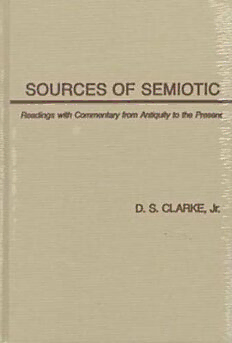
Sources of Semiotic: Readings with Commentary from Antiquity to the Present PDF
236 Pages·1990·0.923 MB·English
Most books are stored in the elastic cloud where traffic is expensive. For this reason, we have a limit on daily download.
Preview Sources of Semiotic: Readings with Commentary from Antiquity to the Present
Description:
This book provides an introduction to semiotic through readings from classic works in the field. In contrast with descriptions of communication systems based on the methods of empirical linguistics and interpretive studies of artistic means of communication, this text delimits semiotic as a logical study with its foundations in the theories of Greek and medieval logicians and the classifications of Charles Peirce.Clarke defines semiotic as the general theory that attempts to specify the logical features of signs and the similarities and differences among the great variety of forms they can take. He samples readings from the field and explains their role in the development of the subject. His discussion begins with the treatment of signs in the early Greek period, starting with Aristotle and ending with Sextus Empiricus. He proceeds through an examination of the works of the medieval philosophers Augustine and Ockham, of post-Cartesians Arnauld, Reid, and Berkeley, and of the founder of modern semiotic, Charles Peirce. Final chapters cover the major writings of those who have shaped the development of the field in the twentieth century: Morris, Skinner, and Carnap of the behavioral school of semiotic; Saussure, Hjelmslev, Barthes, and Jakobson of the Continental school; and the analytic philosophers Strawson, Bennett, Lewis, and Goodman.Each selection, accompanied by Clarke’s commentary, works to restore the links between semiotic and medieval discussions of signs that inform this work. Throughout, Clarke offers students a history that is also an aid for charting a course through the present-day maze of divergent approaches and conflicting methodologies.
See more
The list of books you might like
Most books are stored in the elastic cloud where traffic is expensive. For this reason, we have a limit on daily download.
